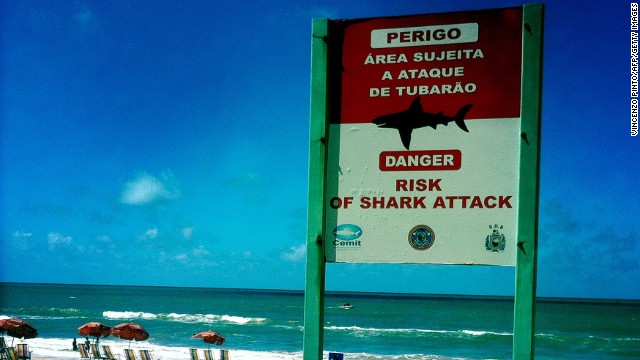The following is further evidence of beach warnings in areas where shark attacks are considered likely. Last year a girl swam in shark infested waters off Brazil, ignoring the warnings on the beach signs. She was attacked by a shark and bled to death.
So there is another data point to add to the mix
.
Yes try this "data point" everyone agrees when someone
VOLUNTARILY engages in higher risk behaviors they
VOLUNTARILY PLACE THEMSELVES and anyone who attempts to help them at a higher risk. You call it a data point most call it simple common sense.
When something like this happens the affect is not isolated. It is felt within the family and community. There were several lifesavers in the area that risked their own safety to assist the girls.
Yes indeed when someone
ignores warnings and suffers the consequences THEY HAVE
IN FACT FOR TOTALLY
VOLUNTARILY and
SELFISH REASONS unnecessarily placed others at risk and
unnecessarily created sadness within their family.
Certainly they
alone are responsible for any ensuing " tragedy" certainly not shark.
These attacks were not on scuba divers, but the example serves to highlight that when there is a serious risk of a shark attack, people and communities take steps to mitigate the risk, even if those steps are ineffective.
Yes they clearly posted the warning signs and since they were
blithely ignored . The community is now considering upping the ante to "
banning swimming". Perhaps if people are to stupid or selfish enough to not regulate themselves they risk encouraging the government to do it for them . This is however is not NEWS ,it happens all the time. The question is what kind of regulation
So are you suggesting Banning Swimming Surfing and Diving ? That would in fact be more "effective" .
I'll wager not I'd speculate even though you don't want to admit it, your trying to back door, justifying culling. Interesting in light of fact that you attempted to expunge "culling" as the primary portion for the most popular poll reply. Oh hell why not have both ways hey?
Scuba divers are not exempt.
No but they are
VOLUNTARILY in the water which of course the sharks aren't .
And finally a number of the more vocal posters are from areas like Norway, the US and Canada where the risk of a fatal shark attack is relatively low or non existent.
Back to dubious ad hominem yet again .....
Ya us land lubbers must be totally clueless about attacks on humans by wild animals ! It's not like people other than in WA get attacked by wild animals when they VOLUNTARILY go into or decide to live in areas inhabited by Bears, Bison, Moose, Mt Lions etc..
One has to wonder WHAT IS THE POINT OF YOUR ENTIRE POST ? Yes people get attacked Yes the risker their VOLUNTARY behavior the more the risk BUT of course that is not being debated nor is that REALLY your point, is it. The most logical speculation is that you are still attempting to justify calling for " RANDOM CULLING" thus
"steps are ineffective. " if not your entire post is pointless. Of course you attempt to avoid actually stating your implied because you have already also stated in another thread that "culling a few sharks" will do nothing to actually significantly reduce the number of sharks there by also rendering it
"ineffective. But why bother with logic or consistency at this point.
None of the above changes the fact that when something voluntarily "INVADES THE Home" of something else, even if just to share in enjoyment of the resources, and suffers consequences. That calling for "random culling" of the "invaded" is dubious and specious
Follow that line of reason to logical conclusion A burglar invades a home to share in the enjoyment of the resources, and the home owner attacks the burglar. Lets randomly "cull" some home owners. That will help ?
Sounds ridiculous to you hey? because you seem to fail to understand not everybody ( in fact most do not ) agree with , your apparent belief that, selfish invasive recreational interests of humans should take president over the lives of the native species. That is what is what is really driving you to relentless promulgating inane statements and conclusions.
But all in all you are keeping the thread alive and entertaining.




